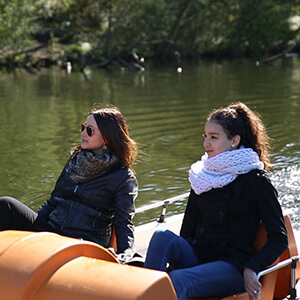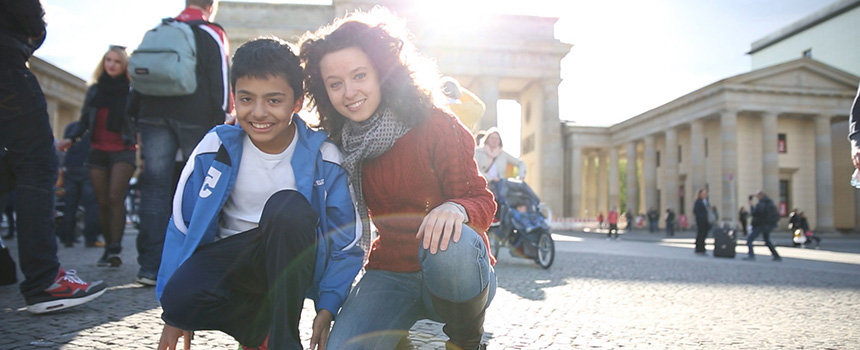 No ticky, no washy - participation in society without money is not possible
No ticky, no washy - participation in society without money is not possible
Leisure activities for tandems in Berlin
What should we do today? This is a question that our tandems probably ask themselves regularly when the meet up. Not so easy, if a primary school child who may even come from a different cultural background and be of limited financial means and a volunteering adult decide to meet on a weekly basis over the next few months and spend some free time together. And when the ideas go flying off like sparks and suddenly 1.000 things become interesting and worth seeing and experiencing, that brings on the next question: How do we pay for it? After all, a trip to the museum or the zoo, a boat ride on the river Spree or the attempt to bake a cake together – all of those need at least a little money. And even a trip to a free library is twice as good with an ice cream at the end of it. Many take it for granted to spend the odd euro here or there without thinking about it too much. For the parents of the children in our programme, this is pure luxury. The activity money makes it possible for our children and their mentors to take advantage of the variety that this vibrant city of Berlin has to offer and even make the odd little wish come true.
Necessity
Activity funds for the shared, sensible, integrative and educational leisure activities of one tandem.
Activity
The tandems are given an activity budget for the duration of eight months, jointly deciding how to use these funds.
Countable effort
Number of tandems that use their activity budget for meaningful leisure activities during their weekly outings.
Result
By getting to know and trying out new activities, the children discover new interests and talents, learn in a playful way and broaden their horizon.
Systemic effect
Better opportunities for participation in society regardless of social background; bridging the different lifestyles in Berlin.
Background
That an unequal distribution of wealth in Germany has created a rift between the poor and the rich that is much more pronounced than in other OECD countries, is nothing new (OECD, 2015). This affects children the most: 2.7 million of them are classified as poor or at risk of poverty. Children from disadvantaged families engage in activities outside the home less often than children from more well-off families (Paritäter, 2016). Because many of the cultural and socially inclusive activities that encourage extracurricular learning and which can stimulate new curiosity come at a price, many children are excluded from taking part in society, which then further causes the creation of parallel societies and social inequality.
In Reinickendorf, one of Berlin’s most socially deprived districts (Senatsverwaltung für Gesundheit und Soziales, Berlin 2013), 12 refugee shelters with 3.000 spots have been set up that mostly have families with children living in them. Precisely to foster the integration of these children it is important to make it possible for them to participate in and help them get a foothold in the society of their new home.
A mentoring programme can reach children that are particularly open to leisure opportunities but know very few places and activities. A one-on-one mentor/mentee relationship encourages the exchange between different realities and creates an atmosphere of trust. Discovering interests, exploring new places and playfully learning encourages these children to build a positive perspective on the future and is a step towards more educational equality.
The good deed
We give an activity budget of 150 euros to each tandem, which they have sole and joint responsibility for. This allows participation in society for the participating children and adults that does not require money on their part. For the children, this means taking part in activities that have so far been denied to them. They are able to develop new interests and broaden their horizon. They get to know their city with all its various cultural and child-friendly possibilities and are shown new perspectives.
Challenge
The greatest challenge is equally the greatest opportunity: the children have a say on what is to be done and experienced with their funds. On the other hand, that can result in children, who do not yet understand the value of money, have unrealistic ideas or ask for expensive activities that cannot be realised long-term. The challenge therefore is to teach the children to be sensible with money and learn to appreciate being together on the many activities that cost very little.

AboutGermany
Berlin
Capital
81 413 100
Number of inhabitants
40 952 USD
Gross domestic product per capita per year
6
Human Development Index
Germany has the highest population in Europe, but is having fewer and fewer children. There are today more 50-year-olds than new-borns.
About the organization and further information
Association
kein Abseits! e.V.
Website
Transparency International




